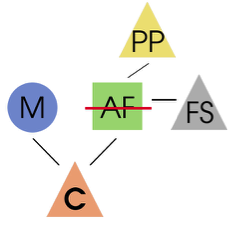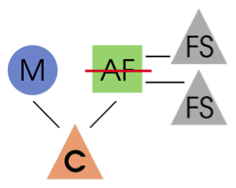GENETIC RECONSTRUCTION TESTING INFORMATION

Who needs to be tested? - Option 1
One Mother, one Child, one Paternal Parent (PP) of the Alleged Father (AF), and one Full Sibling (FS) of the Alleged Father (AF).

Who needs to be tested? - Option 2
One (1) Mother, one (1) Child, and two (2) Full Siblings (FS) of the Alleged Father (AF).
Genetic reconstruction is used to test the relationship between a child and biological relatives of the alleged father, if he is deceased or unavailable for testing.
Turnaround Time
- Five (5) business days from receipt of all samples
Chain-of-Custody Requirements
Chain-of-custody requirements must be fulfilled for test results to be defensible in any legal situation, such as inheritance disputes. These requirements include the following:
- Samples are collected by a neutral third party, such as a clinic or laboratory
- The individuals tested are positively identified (i.e., they present a government-issued ID to be photocopied and/or they are photographed and fingerprinted)
- A standard DNA kit is used
- Each party completes and signs a Client Identification and Consent Form
- Guardianship of tested minor must be verified at the time of signing consent
- The kit may not be in the possession of the clients prior to or after being collected
Non-Chain of Custody Requirements
In a non-chain of custody test, samples can be collected by the patients themselves or assisted by collection site (High 5 Fingerprinting). Results of this test are for personal knowledge only and may not be used for legal purposes.
- An in-home kit is used, and buccal samples can be collected by the patients themselves, or assisted by collection site, at a time and place of their choosing
- Since the origin of the samples cannot be verified, names are listed on the report in the same way they are labeled on the samples
- A unique barcode is assigned to each kit and appears on the report as a reference for the case
- Barcoded kits are assigned to your account for easy reference
Notes
- There are several different scenarios for genetic reconstruction. An ideal situation would be to test the mother, child, one parent of the deceased, and one or more full siblings of the deceased. We can also perform the test if we have two full siblings of the deceased, the mother, and the child. For circumstances other than these, please contact your case manager
- Do not test half-siblings of the deceased or an untested alleged father since they will not share enough common DNA with the child
- Generally speaking, biological-relationship testing such as genetic reconstruction and siblingship testing is not as definitive as DNA parentage testing. It is not possible to determine with absolute certainty whether two people are siblings or biologically related in some way other than the parent-child relationship
- Results show a Combined Relatedness Index, a statistical value showing the genetic odds in favor of the relationship, and a Probability of Relatedness
- If the laboratory determines the results are inconclusive, they may suggest testing additional relatives. Future testing requires additional costs, so please contact your case manager with questions about pricing


